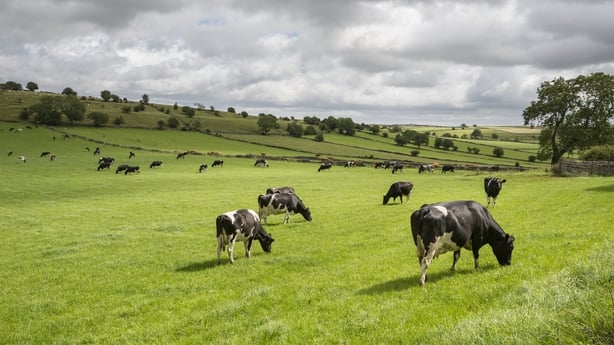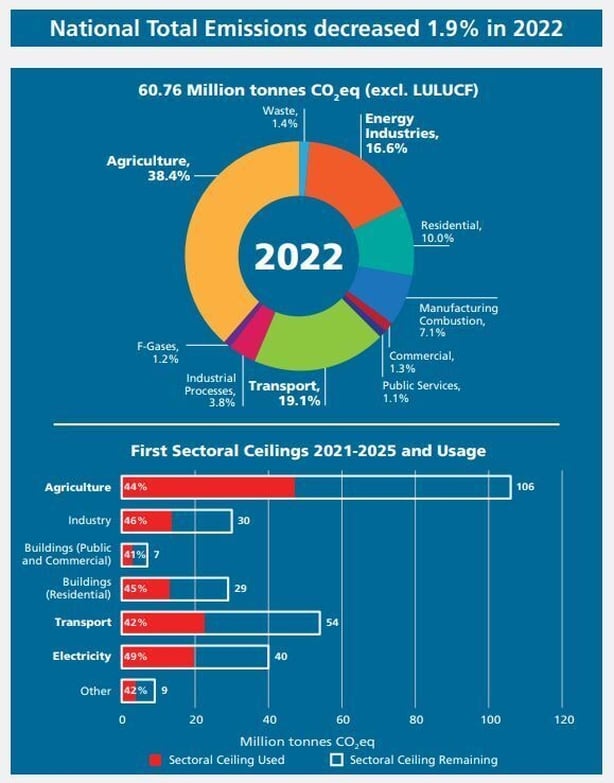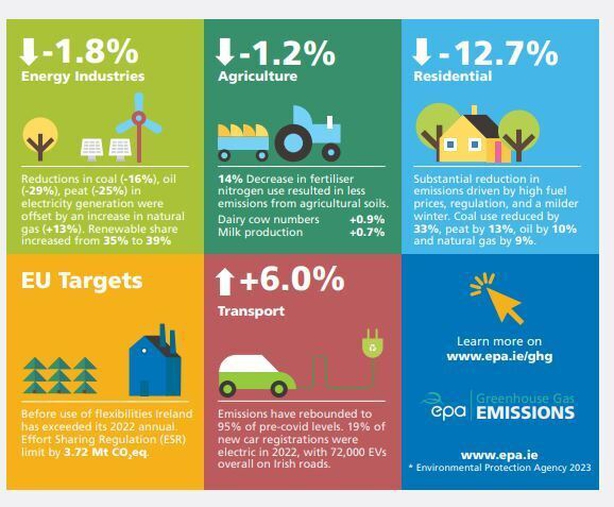Ireland's greenhouse gas emissions decreased in 2022 compared with the previous year, according to a new report from the Environmental Protection Agency (EPA).
Total emissions were 1.9% lower due to decreases in the residential, agricultural and energy sectors.
However, emissions from the transport sector increased by 6%.
The EPA's latest assessment of annual greenhouse gas emissions has found that small progress in reducing harmful emissions has been made, but Ireland is still falling short of the reductions required to meet national and EU targets.
Overall, emissions dropped by 1.9% in 2022 compared with 2021 levels.
In the energy sector, emissions fell by 1.8% as a result less coal, oil and peat being burned for power generation.
Coal use was down 16%, oil fell by 29% and peat decreased by 25%.
However, some of these reductions were offset by an increase in the burning of natural gas.
Renewable electricity also contributed to the overall sectoral reduction. It amounted to 38.6% of the electricity generated, which is an increase of more than 3% compared to 2021.

In the agriculture sector, emissions fell by 1.2% because of a 14% reduction in the use of artificial nitrogen fertiliser resulting in less emissions from soils.
The reductions occurred despite an increase in dairy cow, other cattle and sheep numbers.
The agriculture sector is responsible for over 38% of emissions.
It remains the largest contributor to Ireland’s emissions with nearly 61 million tonnes emitted last year.

Emissions from the residential sector decreased 12.7% due to drastic reductions in domestic fuel consumption last year, which the EPA said was price and regulation-related.
Coal use decreased by 33%, peat by 13%, oil by 10% and natural gas by 9%.
The EPA said a milder winter in 2022 helped reduce residential energy consumption.

However, in the transport sector emissions rose 6% as road transport reaches 95% of pre-Covid levels.
Sales of petrol and diesel were up 14% and 5.5% respectively.
The EPA said 72,000 battery electric or hybrid vehicles were sold last year, exceeding the target set by the Government for 2022.
It also amounts to 8% of the target set for 2030.
The agriculture sector is followed by transport at 19.1%, the energy sector at 16.6% and the residential sector at 10%.
EPA Director General Laura Burke welcomed the decrease in emissions, but "it's not to underestimate the significant challenge ahead of us".
"We've seen year-on-year increases so now hopefully we’re kind of tipping that and moving in the right direction, but I think we are highlighting be cautious about this because it is a very small reduction," she told RTÉ’s Morning Ireland.
We need your consent to load this rte-player contentWe use rte-player to manage extra content that can set cookies on your device and collect data about your activity. Please review their details and accept them to load the content.Manage Preferences
"What we’re seeing is we exceeded our EU legally binding target for 2022 because the level of reduction is too small.
"And also then if you look at the carbon budgets between now and 2025, what we’re seeing is you’d need a 12.4% reduction each year, between now and 2025, to hit those targets."
Ms Burke said that to meet that target it would result in "very significant reductions".
"In areas such as agriculture you’d need an 8% reduction per year, in electricity you’d need a 17% reduction per year," she told the programme
She said it would be "extremely difficult" and the 12% reduction "would be higher than we’ve achieved previously in Ireland, even during the recession.
"We really should welcome the reduction. I think it’s really, really good that its across all sectors other than transport. And even in transport, we’re still not at pre-pandemic levels."
Ms Burke said it was "really positive to see that reduction" in agriculture and that for the coming years there is a "need to build on that momentum of reduction and really drive changes."







